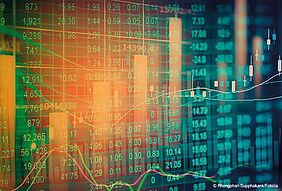After an extraordinary year with a global recession of historic proportions triggered by the Corona pandemic, the global economy and the economic environment for the world economy improved again in the second half of 2020. Nevertheless, the world is struggling with the second major wave of infection and large-scale "lockdowns" at the start of 2021. Certain sectors of the service industry, such as tourism and catering, are particularly hard hit, rather than the industrial sector. As the population becomes increasingly immunised with corona vaccines, the pandemic may then gradually taper off and global coronavirus restrictions diminish. However, the greatest risks to the positive course of the corona pandemic as presented are insufficient supply of vaccines to large segments of the population, viral mutations or emerging serious side effects leading to increased vaccination scepticism. The global economy is currently at the beginning of a new business cycle, strongly supported by internationally loose monetary and active fiscal policies. In the process, public debt is being significantly expanded in most countries and central banks continue to inflate their balance sheets through increased bond purchases. At the beginning of 2021, two geopolitical conflicts that have held the global economy in thrall in recent years have eased. On the one hand, a hard BREXIT was avoided at the turn of the year, and on the other hand, with the election of the new US President J. Biden, a more reliable policy for international cooperation has become more likely. It is therefore to be expected that the US trade dispute with China and the EU will not end but at least be de-escalated. These political factors support the improving economic framework conditions for the global economy.
In this environment, we expect the global economy to grow by +5.4% in 2021. This is the first time in several years that this figure has been above its long-term average of +3.5% since 1980, with the economy likely to gain increasingly noticeable momentum in the further course of 2021 after a tough Q1. A look at the global data suggests a relatively synchronised positive development in the industrialised and emerging markets. In the emerging markets, China is once again the driving force this year and is providing significant growth impulses for the global economy. The Chinese government quickly brought the Corona pandemic under control through rigorous measures and thus laid the foundation for strong growth in industrial production, rising exports and increasing retail sales in the second half of 2020. The positive purchasing managers' indices from China indicate a continuation of this trend. In China, we expect a GDP growth rate of +8.0%. For the US, we forecast GDP growth of +5.5% in 2021. The economic catch-up process will be driven by private consumption, which accounts for around three-quarters of US GDP and has been growing steadily at around 3% p.a. for years. This will benefit from the expected revival of the labour market, the booming housing market and the surplus savings of US households accumulated during the Corona crisis. In the euro area we expect GDP growth of +4.2%. The economy should really take off in the second half of the year, when enough vaccine is available to achieve herd immunity.
In this early phase of the business cycle, we expect significant sales and earnings growth at the individual company level. The key driver is likely to be improved profit margins as many companies have reduced costs during the crisis. The growth in corporate profits we expect thus provides a good basis for rising share prices. Due to the low interest rate environment, we currently also believe that an expansion of valuation levels for the international equity markets is more likely than a reduction in them.
For the segments US equities, European equities and German equities, our forecasts for the end of 2021 are therefore: S&P 500 Index 4,200 points, Euro Stoxx 50 Index 4,000 points and DAX 14,500 points. For the international stock markets, in addition to the expected double-digit growth in corporate profits, the significantly improving global economy and internationally supportive monetary and fiscal policies are of particular importance.
The asset class of bonds continues to be highly valued. Attractive current interest rates can be found outside the Eurozone, e.g. in the USA or the emerging markets. In the portfolio context, bonds continue to play an important role in the context of diversification and for managing portfolio risk. For the 10-year Bund yield, we expect only a small increase of -0.30% at the end of 2021 because inflation in the Eurozone is expected to remain below the ECB's target despite the recent increase in container freight rates and oil prices. Central banks ultimately control yield levels, yield curves and risk premiums through their purchase programmes. It can be assumed that the ECB is unlikely to impose a major rise in yields on the highly indebted states in the euro area. For 10-year US Treasuries, we also expect only a small increase to 1.40%. Within the bond segment, we consider higher-yield spread products such as high-yield bonds from Europe and the USA to be significantly more attractive than government bonds. The expected economic recovery in 2021 combined with an expansionary monetary policy should be the main drivers for narrowing high yield spreads and continued favourable refinancing opportunities. We expect the default rate for high-yield bonds to fall noticeably again as the economic recovery progresses. For 2021, we expect continued USD weakness and forecast a EUR/USD of 1.25 by the end of the year, especially against the backdrop of an expected significant increase in US government debt under the new administration.
The influence of geopolitical and macroeconomic risks can repeatedly lead to shocks in the coming quarters, which can trigger high fluctuations on the capital markets. It should be borne in mind that some looming risks may also have a positive outcome. In such a field of tension, the asset management portfolio should be able to bring its advantages of active management and the use of different capital market segments to bear.
Peter Teschke, Capital market expert
This document has been prepared with the greatest possible care. For market assessments or benchmark information, the Bank obtains data or information from sources it considers reliable. The Bank cannot guarantee the accuracy, timeliness and completeness of this data or information.
All data serve to fulfil the asset manager's reporting obligations or for information purposes and to support the investor's independent investment decision. This document constitutes neither investment advice nor an offer of investment advice. It does not replace individual investor and investment-oriented advice and does not contain any concrete recommendations for action or investment. This document does not claim to be all-inclusive or to contain all the information that an investor needs for his investment decisions. Historical observations or past performance are not a reliable indicator of future developments.
Only the contractual documents handed over to the client, in particular the terms and conditions of business and sales documents, are legally binding for the content of a contractual relationship between the client and Fondsdepot Bank GmbH.



